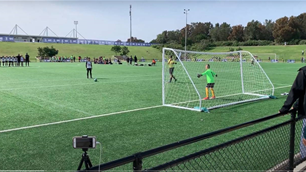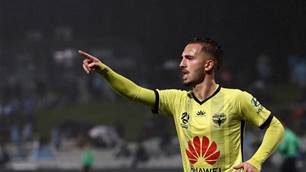EXCLUSIVE: The success of African-born players Eugene Dadi and Kofi Danning could see a pipeline of undiscovered gems adorning the A-League in the next few years.
Ivory Coast-born Dadi, who has one cap to his name for the Elephants, has enjoyed a standout season with Perth Glory scoring ten goals from just 13 starts this campaign.
Following a stint with FC Vaduz in the Swiss Super League during the A-League off-season, Dadi will be back for at least one more season with the purple shirts.
However, Dadi, 35, is keen to stay in Australia whenever he decides to hang up his boots.
What's more, former English Premier League star and Glory player Brian Deane is a director and partner of Linksport football academy.
The company runs academies in Ivory Coast, Cameroon and Senegal. According to its mission statement, the aim is to apply the partners' professional expertise and international contacts to promote and support the development of gifted young West African athletes.
"For the most gifted, that will mean eventually helping them prepare for careers at the highest level in Europe," says Linksport.
For talented African footballers, the A-League could be used as a one or two season stepping stone to much bigger leagues in Europe or Asia.
And with Australia being a summer competition, African players should not have problems adapting to the conditions.
According to the player's agent Ritchie Hinton from Elite Sports Properties, Dadi could be a vital link between African players and the A-League in years to come.
Hinton says one of the reasons why Australia has not mined the African talent base is because no-one really knows the terrain. He believes this might be changing thanks to players like Dadi.
"In the same way that no-one really knew how to do business in Asia before we became part of the AFC, with the exception of fiddling round the edges in ex-pat locations such as Singapore and Hong Kong, no-one really knows how to operate in Africa," he told au.fourfourtwo.com.
The added difficulty is a technological one – things we take for take for granted, such as internet access to player statistics and DVD footage are not always readily available, Hinton explains.
"Anyone who took the time and spent a relatively modest amount of money going over there with the right people to guide you would be astonished at the talent available," he said.
Ghanaian youth international Ransford Banini migrated to this country following the World Youth Championships of 1993.
Ghana reached the final of the tournament and the nuggetty defender/midfielder later played NSL football in Melbourne.
Glory also imported Nigerian striker Samson Siasia in the late 90s. Jonas Salley is another Ivorian plying his trade in the A-League and Glory keeper Tando Velaphi is part Zimbabwean.
But as far as our domestic competition goes, Africans players have generally been few and far between over the years.
However, added to the Dadi success has been increased migration from Africa over the last few years.
We know of the success of Sydney FC's Kofi Danning – who arrived in Australia as a ten-year-old from Ghana - but there are other Africans in the system who are poised to show themselves.
Youngsters Million Butshiire, Kamal Ibrahim, Teddy Yabio and Danai Gaspare were all involved with the Joeys last year. All four hail from Africa (Congo, Ethiopia, Sudan and Zimbabwe respectively).
Hinton added: "We hear about A-league coaches going on overseas scouting trips all over the world, but nobody has been to Africa yet.
"The typical African player is physically superb with instinctive flair.
"Although we see many African boys make the move to Europe due to the French colonial history of many of their countries, many boys do not have EU passports and therefore have restricted opportunities to pursue a professional career in the European leagues."
And former Glory coach and FFA technical director Ron Smith added: "Certainly, based on recent trends, we have quality young African players in our system now and see no reason why that trend should not continue.
"Such players can bring something to our game."
Having such players begin to do well in the development system and the A-League should further promote the A-League in Africa. And Hinton feels he has the connections to make this happen.
"For these boys, Australia is a desirable destination and wages are not an issue," he said.
"These players represent excellent value in a country like Australia where we operate under a tight salary cap, and we are talking about quality players here who have represented their country.
"We all know that we can't hope to compete with the wages paid in Europe and Asia at this time, and the 'samba' theme is wearing thin with the number of under-performing South Americans we have seen over here, so why not look at African talent?
"Players such as Eugene Dadi and Brian Deane are well known in these countries and through our [ESP's] established relationships with these guys; we have access to these players which is unrivalled in Australia."
Following a stint with FC Vaduz in the Swiss Super League during the A-League off-season, Dadi will be back for at least one more season with the purple shirts.
However, Dadi, 35, is keen to stay in Australia whenever he decides to hang up his boots.
What's more, former English Premier League star and Glory player Brian Deane is a director and partner of Linksport football academy.
The company runs academies in Ivory Coast, Cameroon and Senegal. According to its mission statement, the aim is to apply the partners' professional expertise and international contacts to promote and support the development of gifted young West African athletes.
"For the most gifted, that will mean eventually helping them prepare for careers at the highest level in Europe," says Linksport.
For talented African footballers, the A-League could be used as a one or two season stepping stone to much bigger leagues in Europe or Asia.
And with Australia being a summer competition, African players should not have problems adapting to the conditions.
According to the player's agent Ritchie Hinton from Elite Sports Properties, Dadi could be a vital link between African players and the A-League in years to come.
Hinton says one of the reasons why Australia has not mined the African talent base is because no-one really knows the terrain. He believes this might be changing thanks to players like Dadi.
"In the same way that no-one really knew how to do business in Asia before we became part of the AFC, with the exception of fiddling round the edges in ex-pat locations such as Singapore and Hong Kong, no-one really knows how to operate in Africa," he told au.fourfourtwo.com.
The added difficulty is a technological one – things we take for take for granted, such as internet access to player statistics and DVD footage are not always readily available, Hinton explains.
"Anyone who took the time and spent a relatively modest amount of money going over there with the right people to guide you would be astonished at the talent available," he said.
Ghanaian youth international Ransford Banini migrated to this country following the World Youth Championships of 1993.
Ghana reached the final of the tournament and the nuggetty defender/midfielder later played NSL football in Melbourne.
Glory also imported Nigerian striker Samson Siasia in the late 90s. Jonas Salley is another Ivorian plying his trade in the A-League and Glory keeper Tando Velaphi is part Zimbabwean.
But as far as our domestic competition goes, Africans players have generally been few and far between over the years.
However, added to the Dadi success has been increased migration from Africa over the last few years.
We know of the success of Sydney FC's Kofi Danning – who arrived in Australia as a ten-year-old from Ghana - but there are other Africans in the system who are poised to show themselves.
Youngsters Million Butshiire, Kamal Ibrahim, Teddy Yabio and Danai Gaspare were all involved with the Joeys last year. All four hail from Africa (Congo, Ethiopia, Sudan and Zimbabwe respectively).
Hinton added: "We hear about A-league coaches going on overseas scouting trips all over the world, but nobody has been to Africa yet.
"The typical African player is physically superb with instinctive flair.
"Although we see many African boys make the move to Europe due to the French colonial history of many of their countries, many boys do not have EU passports and therefore have restricted opportunities to pursue a professional career in the European leagues."
And former Glory coach and FFA technical director Ron Smith added: "Certainly, based on recent trends, we have quality young African players in our system now and see no reason why that trend should not continue.
"Such players can bring something to our game."
Having such players begin to do well in the development system and the A-League should further promote the A-League in Africa. And Hinton feels he has the connections to make this happen.
"For these boys, Australia is a desirable destination and wages are not an issue," he said.
"These players represent excellent value in a country like Australia where we operate under a tight salary cap, and we are talking about quality players here who have represented their country.
"We all know that we can't hope to compete with the wages paid in Europe and Asia at this time, and the 'samba' theme is wearing thin with the number of under-performing South Americans we have seen over here, so why not look at African talent?
"Players such as Eugene Dadi and Brian Deane are well known in these countries and through our [ESP's] established relationships with these guys; we have access to these players which is unrivalled in Australia."
Related Articles

A-League alert: African-born sensation's 3 talented brothers

Fresh talent flock to ambitious A-League outfit's pro pathway













